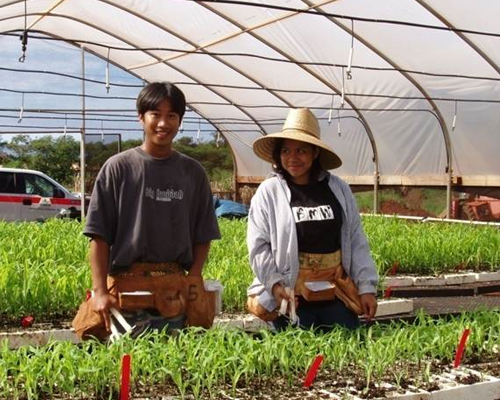University of Hawaiʻi - Leeward Community College
The Plant Biology and Tropical Agriculture Academic Subject Certificate Program - $500 Stipends Are Available!
Plant the Seed for a New Career
Do you enjoy working outdoors or growing plants? Are you concerned about food security and want to grow your own food? Are you also interested in a career that uses modern technology? The Plant Biology and Tropical Agriculture Academic Subject Certificate provides you the education and training to succeed in Hawaii's diversified agriculture workforce. It’s also a perfect start to a four-year degree in biology, agriculture and natural resource management, or developing your own agribusiness. A new 2-year AS degree in Plant Biology and Tropical Agriculture is proposed to start in Fall 2014. In this program, you will learn botany, plant physiology, soil and water science as you grow a field crop from seed to seed explore attractive career opportunities in agriculture and soil conservation. Here are descriptions of the courses available in this program:
| Course | Description | ||
|---|---|---|---|
Orientation to Hawai‘i’s Agriculture Industry |
You’ll become familiar with different agricultural operations/systems in Hawai‘i through lectures, guest speakers and field trips. |
||
Integrated Pest Management |
You’ll learn how to control plant pests, including diseases, insects, mites, nematodes, and weeds. | ||
Soil Technology |
Learn about physical, chemical, and biological properties of soil and growing media. Discover principles of soil formation, composition, texture, organic matter, soil water, pH, plant nutrients, amendment and fertilizers. You’ll also find out how to properly manage soil to optimize plant growth. | ||
Introduction to Plant Science/ Introduction to Plant Science Lab |
This is your Introduction to botany and plant physiology. Learn the relation of plants, nutrients, and environment, cultural practices to tropical crop production. Cultivate selected economic crops using seed to seed model in student gardens or greenhouse, and perform field and laboratory tests involving plant, soil and seeds. |
||
Introduction to Environmental Science |
You’ll learn how to analyze the relationships and interactions of physical, biological, technological, and political components using scientific methods of inquiry. This course covers food supply and safety, water quality, pollution control, biodiversity, environmental policy. | ||
Tropical Landscape |
This class introduces your to principles and practices to maintain plant and landscape through the combination of hands-on lab and lectures. | ||
Introduction to Horticulture and Plant Propagation |
You’ll learn about various divisions of horticulture with a focus on plant propagation, and learn theoretical and applied aspects of sexual and asexual reproduction of plants, propagation of selected plants by seed, cuttings, grafting, layering, and micropropagation/tissue culture. | ||
Ornamental Plant Materials |
You will learn to identify major ornamental plants used in Hawaii’s landscapes, include trees, shrubs, vines, ground covers, flowers, house plants and natives. You’ll also learn how to select ornamental plants for landscape according to their habits and growing requirements. | ||
Introduction to Crop Improvement |
This course will introduce you to genetic principles and practices to improve crop plants through lectures and hands-on laboratories. You’ll learn tools employed by plant breeders to create genetic variation and perform selection on self-pollinated, cross-pollinated and clonally propagated crops. | ||
Introduction to Organic Agriculture |
This course is an introduction to natural resource sustainability in agriculture. You’ll find out basic principles of soil science, plant culture, and pest management are explained and organic farming techniques are practiced. The societal, environmental, and business reasons for engaging in organic agriculture are explored. The goal of this course is to increase understanding of organic farming and to introduce sustainable agriculture practices that can be applied in Hawai‘i. | ||
Plants in the Hawaiian Environment |
You’ll learn principles of how native plants arrived and developed in Hawai‘i and the impact on them by man’s activities. Lab work includes learning basic plant structure and function, identification of native and introduced plants by visiting natural and garden sites, uses by Hawaiians and importance of tropical plants worldwide. | ||
|
You’ll enjoy hands-on learning in Leeward Community College’s shade house and gardens in propagation, cultivation, and uses of native, Hawaiian traditional and other cultural plants found in Hawai‘i. Proper nutritional principles are applied to plant uses including food preparation. Internet applications for marketing, developing micro-propagation skills, field trips, guest speakers and student projects provide additional active learning opportunities. | ||
| Source: Leeward Community College | |||
To Apply to Leeward Community College Plant Biology and Tropical Agriculture Program, click here!
Contact us to learn more about the $500 stipend!


